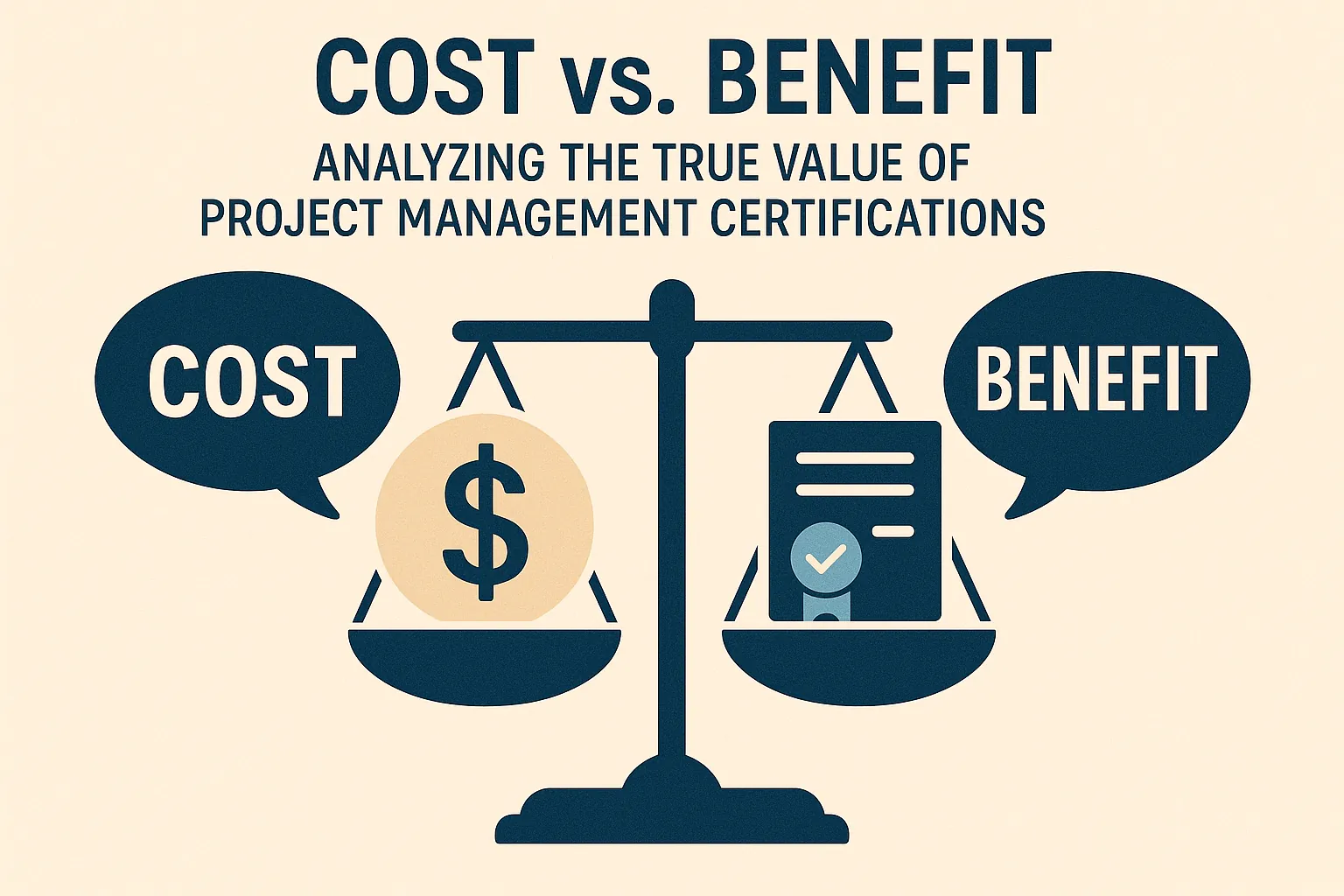Introduction
Project management certifications have become increasingly popular among professionals seeking to enhance their skills and career prospects. These certifications, such as the Project Management Professional (PMP)® credential, are designed to validate an individual’s expertise in managing projects effectively across various industries. They signify a commitment to the profession and a mastery of essential project management principles.
The rise in demand for project management certifications can be attributed to several factors. Organizations are increasingly recognizing the value of certified project managers in driving successful project outcomes, leading to a surge in job opportunities for those with these credentials. As businesses strive for efficiency and effectiveness, the need for skilled project managers has never been greater, making certifications a valuable asset for career advancement.
This blog post aims to provide a comprehensive cost-benefit analysis of project management certifications. We will delve into the financial commitments involved, including exam fees, training costs, and membership expenses, while also highlighting the potential benefits such as increased job opportunities, higher salary potential, and enhanced professional credibility. By examining both sides of the equation, we hope to equip budget-conscious professionals and students with the information they need to make informed decisions about pursuing project management certifications.
Understanding Project Management Certifications
Project management certifications have become increasingly popular among professionals seeking to enhance their skills and improve their career prospects. These certifications not only validate a professional’s knowledge and expertise in project management but also serve as a significant asset in the competitive job market. Below is a detailed breakdown of common types of project management certifications, their prerequisites, and their recognition in the industry.
Common Types of Project Management Certifications
Project Management Professional (PMP):
- Widely regarded as the gold standard in project management certifications.
- Recognized globally, it demonstrates a high level of competence and experience in managing projects.
Certified Associate in Project Management (CAPM):
- An entry-level certification ideal for those new to project management.
- Requires 23 hours of project management education and is a stepping stone for the PMP certification.
PRINCE2 (Projects in Controlled Environments):
- A structured project management method widely used in the UK and internationally.
- Offers two levels: Foundation and Practitioner, focusing on the principles and processes of project management.
Agile Certifications (e.g., Certified ScrumMaster, PMI-ACP):
- Focus on Agile project management methodologies, which are increasingly popular in dynamic project environments.
- Requirements vary by certification but often include training and experience in Agile practices.
Prerequisites and Requirements
PMP Certification:
- Requires 35 hours of project management education.
- Candidates must have either 7,500 hours of experience leading projects (without a four-year degree) or 4,500 hours (with a four-year degree) along with 60 months of professional project management experience [11].
CAPM Certification:
- Requires 23 hours of project management education.
- No prior project management experience is necessary, making it accessible for students and entry-level professionals [2].
PRINCE2 Certification:
- No specific prerequisites for the Foundation level, but the Practitioner level requires passing the Foundation exam.
- Training courses are recommended to prepare for the exams [12].
Agile Certifications:
- Requirements vary; for example, the PMI-ACP requires 21 contact hours of training in Agile practices and 2,000 hours of general project experience [12].
Recognition and Value in the Job Market
Project management certifications are highly regarded by employers and can significantly enhance a candidate’s job prospects. The PMP certification, in particular, is often seen as a prerequisite for senior project management roles and is associated with higher salaries and career advancement opportunities [3][4].
- Career Advancement: Certified professionals often experience faster career progression and increased job security. Employers value the commitment to professional development that certifications represent [10].
- Higher Salaries: Data indicates that certified project managers can command higher salaries compared to their non-certified counterparts. The investment in certification can yield substantial returns in terms of earning potential [9].
- Credibility and Networking: Certifications enhance a professional’s credibility and provide access to a network of other certified professionals, which can lead to job opportunities and collaborations [10].
Cost Breakdown of Project Management Certifications
When considering a project management certification, it’s essential to evaluate the financial implications alongside the potential benefits. Below is a detailed breakdown of the various costs associated with obtaining project management certifications, particularly focusing on the Project Management Professional (PMP) and Certified Associate in Project Management (CAPM) certifications.
1. Tuition Fees for Certification Courses
- PMP Preparation Courses: These can range significantly in price, with many programs costing between $1,500 to $2,000. Some affordable options may be available, but it’s crucial to ensure that the course is reputable and aligns with your learning needs [6].
- CAPM Courses: Entry-level courses for the CAPM certification are generally less expensive, often falling within the same range as PMP courses, but may vary based on the provider and format (online vs. in-person) [9].
2. Study Materials and Preparation Costs
- Books and Online Resources: Candidates typically invest in study guides, textbooks, and online resources. The cost for these materials can range from $50 to $300, depending on the quality and comprehensiveness of the resources chosen [4].
- Practice Exams and Tools: Many candidates also purchase access to practice exams and other preparatory tools, which can add another $100 to $200 to the overall cost [4].
3. Exam Registration Fees
- PMP Exam Fees: The registration fee for the PMP exam is $405 for PMI members and $575 for non-members. This fee is a significant part of the overall cost, and becoming a PMI member can provide savings on the exam fee [8].
- CAPM Exam Fees: The CAPM exam costs $300 for PMI members and $450 for non-members, making it a more affordable option for those just starting in project management [12].
4. Time Investment
- Study Hours: Preparing for the PMP exam typically requires a commitment of 100 to 150 hours of study time, while CAPM candidates may need around 50 to 100 hours. This time investment can translate into lost income or additional costs if you need to take time off work to study [4][11].
- Course Duration: Many certification courses span several weeks, requiring a consistent time commitment that can impact your schedule and productivity [6].
5. Additional Costs
- Renewal Fees: Both PMP and CAPM certifications require renewal every few years, which involves additional fees. For PMP, the renewal fee is $60 for PMI members and $150 for non-members [4].
- Membership Fees: Joining the Project Management Institute (PMI) costs $129 annually, plus a $10 application fee. Membership can provide discounts on exam fees and access to valuable resources, making it a worthwhile investment for many professionals [1][8].
Potential Benefits of Project Management Certifications
Investing in a project management certification can be a significant decision for budget-conscious professionals and students. However, the potential benefits often outweigh the costs, making it a worthwhile consideration. Here’s a detailed breakdown of the advantages that project management certifications can offer:
- Enhanced Job Prospects and Career Advancement Opportunities: Obtaining a project management certification, such as the PMP (Project Management Professional), can significantly improve your job prospects. Certified professionals are often preferred by employers, leading to greater career advancement opportunities. The certification demonstrates a commitment to the profession and a mastery of project management principles, which can set candidates apart in a competitive job market [2][4].
- Potential for Higher Salaries and Increased Earning Potential: One of the most compelling reasons to pursue a project management certification is the potential for higher salaries. Certified project managers can earn up to 33% more than their non-certified counterparts. This increase in earning potential can make the initial investment in certification worthwhile, especially over the course of a career [6][9].
- Improved Project Management Skills and Knowledge: Certifications provide structured learning that enhances your project management skills and knowledge. They cover essential topics such as budgeting, risk management, and productivity improvement, equipping you with the tools needed to manage projects effectively. This structured approach not only prepares you for real-world challenges but also instills confidence in your abilities [5][8].
- Networking Opportunities Through Professional Organizations: Earning a project management certification often grants access to professional organizations and networks. These platforms provide opportunities to connect with other professionals, share experiences, and learn from industry leaders. Networking can lead to job referrals, mentorship opportunities, and collaborations that can further enhance your career [1][9].
- Increased Credibility and Recognition in the Industry: A project management certification adds credibility to your professional profile. It signals to employers and clients that you possess the necessary skills and knowledge to manage projects successfully. This recognition can lead to more job offers and opportunities for advancement, as organizations often seek certified professionals to lead their projects [2][7].
Considerations: Is It Worth the Investment?
When contemplating whether to pursue a project management certification, it is essential to weigh the costs against the potential benefits. Here’s a detailed breakdown to help budget-conscious professionals and students assess if this investment aligns with their personal and professional goals.
Evaluate Personal Career Goals and Current Job Market Demands
- Career Alignment: Before committing to a certification, individuals should evaluate their career aspirations. Understanding how a certification fits into their long-term goals can clarify its value. For instance, if a professional aims to move into a managerial role, a Project Management Professional (PMP) certification may enhance their qualifications and marketability [6].
- Job Market Trends: Researching current job market demands is crucial. Many employers seek candidates with recognized certifications, which can lead to better job opportunities and potentially higher salaries [2].
Consider Alternative Paths to Gaining Project Management Skills
- Experience and Mentorship: Gaining practical experience through on-the-job training or mentorship can be equally valuable. Many professionals find that hands-on experience, coupled with guidance from seasoned project managers, can provide insights that formal education may not [9].
- Workshops and Short Courses: For those hesitant about the financial commitment of a full certification program, workshops and short courses can offer essential skills without the same level of investment. These alternatives can be a cost-effective way to enhance project management capabilities [9].
Discuss the Importance of Choosing the Right Certification
- Certification Relevance: Not all certifications hold the same weight in the job market. It is vital to choose a certification that aligns with specific career goals and is recognized within the industry. For example, while PMP is highly regarded, other certifications may be more suitable for certain sectors or roles [5].
- Credibility and Recognition: A well-chosen certification can significantly enhance a professional’s credibility. It serves as a validation of skills and knowledge, which can be particularly beneficial in competitive job markets [8].
Encourage Self-Assessment of Financial Situation Versus Potential Career Benefits
- Cost Analysis: The financial investment for a PMP certification can range from $750 to $3000, depending on the course and materials [1]. It is essential for individuals to assess their financial situation and determine if they can afford this investment without compromising their financial stability.
- Return on Investment (ROI): Consider the potential career benefits against the costs. A certification can lead to higher salaries and better job prospects, making it a worthwhile investment for many. However, individuals should realistically evaluate their current job situation and the likelihood of achieving a return on their investment [4][7].
Conclusion
In the pursuit of career advancement, particularly in project management, obtaining a certification can be a significant decision. As we have explored, the costs associated with project management certifications can vary widely. Exam fees for the Project Management Professional (PMP) certification, for instance, range from approximately $600 to $1,400, depending on factors such as PMI membership and training expenses [4][9]. Additionally, candidates should consider the costs of study materials and any preparatory courses, which can further add to the financial commitment [2].
On the other hand, the potential benefits of obtaining a project management certification are substantial. Certified project managers often experience a notable salary increase, with PMP-certified professionals earning about 44% more than their non-certified counterparts [15]. Beyond financial gains, certifications enhance job prospects and credibility within the industry, providing a structured framework and comprehensive skill set that can lead to career advancement opportunities [5][12].
As you contemplate whether a project management certification is worth the investment, it is essential to weigh these costs against the potential benefits in the context of your unique career goals and financial situation. Consider your current position, the industry standards, and how a certification aligns with your aspirations.
Find out more about Shaun Stoltz https://www.shaunstoltz.com/about/.
This post was written by an AI and reviewed/edited by a human.



